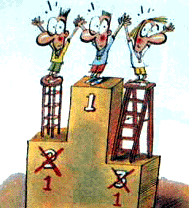|
|

Jewish World Review / July 29, 1998 / 6 Av, 5758
Walter Williams
DETERMINING WHAT NEEDS to be done about primary and secondary education depends
on your vision of how it is produced. Education outcomes depend at least upon two
important variables: the home and the school. But these two variables are related to
one another in a critical fashion, and the assumptions made about that relationship are
crucial to policy.
One assumption is that educational achievement depends on what happens in the home
plus (and the plus is very important) what happens in school. Therefore, if the home
environment is poor and not conducive to educational achievement, it can be offset by
putting more resources into the school.
Another assumption is that educational achievement depends on a multiplicative
relationship between the home and school. That is, educational achievement depends
upon what happens in the home times (and the times is very important) what happens
in school. In that case, if the home environment is worth zero, no matter what
resources we put into schools there's going to be disappointing results. That's because
zero times anything of any magnitude equals zero.
Considerable evidence suggests a multiplicative relationship. Children who tend to do
well in school generally come from two-parent families. Their parents ensure that
homework is done and educational material is in the home. They're lectured about
school behavior and punished when necessary. Parents make sure they attend school
every day and on time. Parents respond to school notices and grades. And, they make
sure their kids go to bed at a reasonable hour.
A good home environment is vital to getting a good education. The measures that
parents take to create a good home environment cannot be done by government or
educators. If what only parents can do is not done, education results will always be
disappointing. If you accept this vital multiplicative relationship between the home
environment and the school, what are the policy recommendations?
Even in the rottenest of schools, there are some kids whose parents provide a good or
marginally good home environment. However, these kids might not achieve anywhere
near their academic potential because of the presence of other kids from poor home
environments. School administrators cannot prevent these kids from bringing the
education process to a virtual halt. Instead of teachers teaching, they spend most of
their class time on discipline, trying to motivate hostile and alien minds and vainly
attempting to help chronic truants to catch up.
The education establishment and the civil-rights establishment seem to have the
attitude that no kids shall be educated well until it is possible for all kids to be educated
well. That's what's implied in their argument against school vouchers and tuition tax
credits, when they say, "We shouldn't abandon public schools!"
But there's a bit of hypocrisy in that message, since public-school teachers send their
own children to private schools at a much greater rate than the general population.
Black teachers nationally are 50 percent more likely than black parents in general to
use private schools.
You tell me what's compassionate about condemning kids, whose parents try to create
a good home environment, to unsafe and poor-quality schools. We ought to set as our
education priority the provision of high-quality education to kids who are ready and able
to use
 Education production
Education production
 This additive relationship has been the ruling assumption for the past several decades.
The nation has been trying to improve education by dumping billions of dollars into
schools, equipment, books and teachers with little to show for it.
This additive relationship has been the ruling assumption for the past several decades.
The nation has been trying to improve education by dumping billions of dollars into
schools, equipment, books and teachers with little to show for it.
